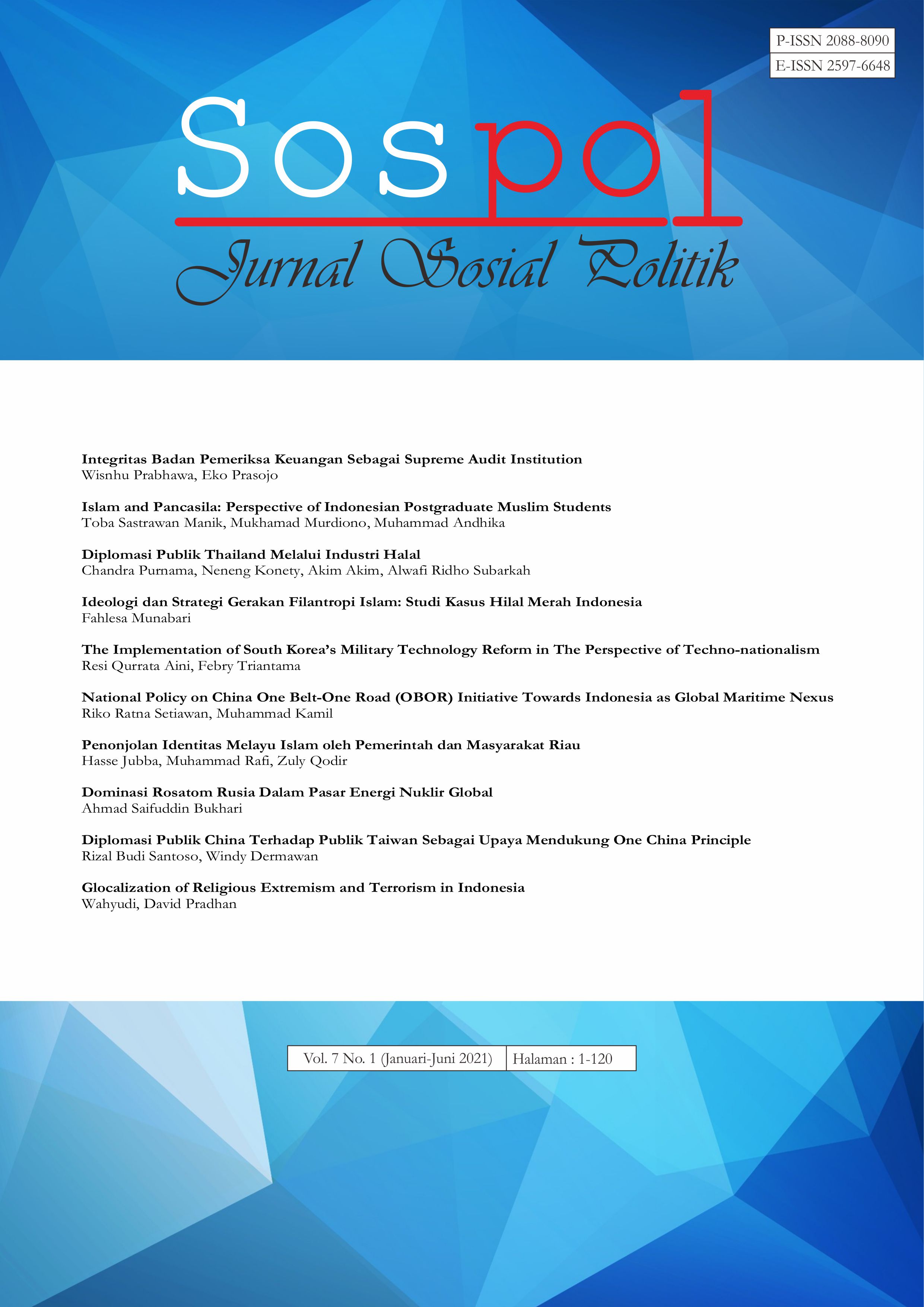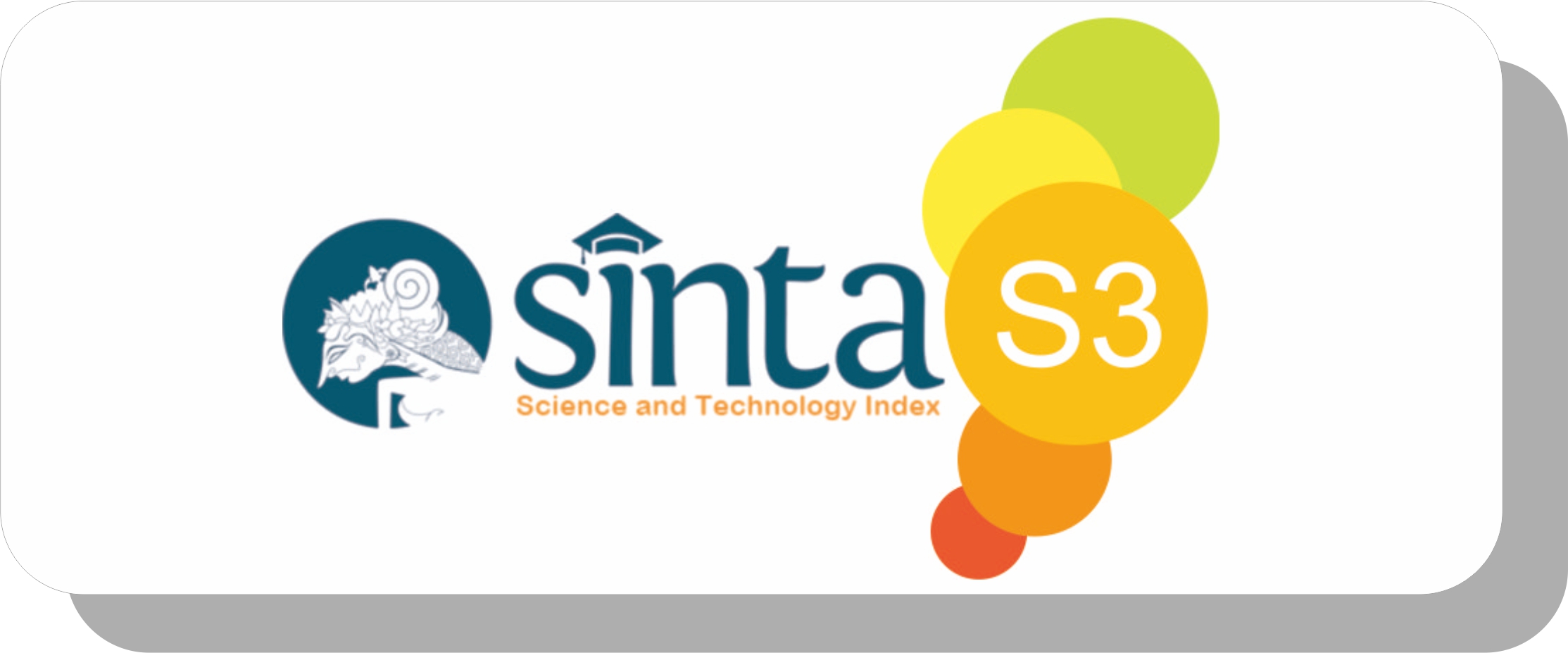Diplomasi Publik Thailand Melalui Industri Halal
DOI:
https://doi.org/10.22219/sospol.v7i1.13968Abstract
This study aims to explain the halal industry as Thai public diplomacy. The image as Muslim friendly country become the objective of Thai government. The concept of halal and public diplomacy applied to understanding Thailand's economic development policies, especially in the manufacturing and tourism sectors. The qualitative research method uses data collection techniques based on interviews and literature studies. The researchers conducted in-depth interviews with the competent authorities and parties involved in the Thai halal industry policy. It examines the Thai government through the role of Ministry of Tourism and Sports develops Halal industry include the increasing of MICE facilities for Muslim tourists. The development of a halal certification system in Thailand in collaboration with Chulalongkorn University. The government established the Halal Industry Center on the southern border of Pattani province. Thai Agricultural Halal Standard (TAS 8400-2007) becomes the legal basis for implementing halal certification, which refers to the international halal standard - Codex. Thailand's halal food market is growing 20 percent every year and making it the sixth-ranked country as a halal food exporter. The China, 57 OIC member countries, the United States, India and Russia, are Thailand's main markets. To promote Thailand's halal tourism and industry, the government collaborates with ASEAN, Middle East countries and regularly participates in organizing exhibitions and international business forums. The Thai government's efforts have had a positive impact on national income and an increase of 10 per cent of the number of Muslim tourists every year.
Downloads
References
Al Jazeera. (2017). The Muslims of South Korea. Retrieved March 30, 2021, from Al Jazeera website: https://www.aljazeera.com/gallery/2017/11/15/the-muslims-of-south-korea#:~:text=The number of Muslims in,be around 100%2C000%2C including foreigners.&text=Seoul%2C South Korea – This year,history of Islam in Korea
Ali, M. (2016). Konsep Makanan Halal dalam Tinjauan Syariah dan Tanggung Jawab Produk Atas Produsen Industri Halal. AHKAM : Jurnal Ilmu Syariah, 16(2), 291–306. https://doi.org/10.15408/ajis.v16i2.4459
Aree, S. (2019). Thai Halal: ‘Religious Compliance and Scientific Support.’ Retrieved March 25, 2020, from Thai Halal Food Information Center website: http://www.thaihalalfoods.com/EN/food_situation.php?id=6
ASEAN Information Center. (2015). Thailand foresees the future of global Halal Food Mark.
Asian Development Bank; ASEAN Secretariat. (2017). IMT-GT Implementation Blueprint 2017-2021. Retrieved from https://www.adb.org/sites/default/files/related/41543/imt-gt-implementation-blueprint-2017-2021.pdf
Ayad, N. (2012). Strategic Public Diplomacy. In M. A. Gustović-Ercegovac (Ed.), Diplomacy Academy Proceedings (Vol. 9, pp. 23–32). Retrieved from http://da.mvep.hr/files/file/pdf/120228_diplomatska_izdavastvo_vol9.pdf
Bangkok Post. (2018a). NFI aims to boost Thai Halal food industry. Retrieved March 25, 2020, from Bangkok Psot website: https://www.bangkokpost.com/business/1394058/nfi-aims-to-boost-thai-halal-food-industry
Bangkok Post. (2018b). Thailand Halal Assembly 2018. Retrieved March 26, 2020, from Bangkok Psot website: https://www.bangkokpost.com/business/1597018/thailand-halal-assembly-2018
Bangkok Post. (2019). Thailand ready to tap busy Muslim travel market. Retrieved March 25, 2020, from Bangkok Psot website: https://www.bangkokpost.com/business/1696452/thailand-ready-to-tap-busy-muslim-travel-market
CNN International. (2017). Makeup, meds and sports wear: Why halal has become big business. Retrieved March 25, 2020, from CNN International website: https://edition.cnn.com/2016/08/29/world/halal-industry/index.html
COMCEC Coordination Office. (2016). Muslim Friendly Tourism: Developing and Marketing MFT Products and Services In the OIC Member Countries. Retrieved from https://sbb.gov.tr/wp-content/uploads/2018/11/Muslim_Friendly_Tourism_MFT_Developing_and_Marketing_MFT_Products_and_Services_in_the_OIC_Member_States.pdf
CrescentRating. (2014). Muslim visitor arrivals to Japan to reach 1 million by 2020. Retrieved March 25, 2020, from CrescentRating website: https://www.crescentrating.com/magazine/press-releases/3835/muslim-visitor-arrivals-to-japan-to-reach-1-million-by-2020.html
Cuesta-Valiño, P., Bolifa, F., & Núñez-Barriopedro, E. (2020). Sustainable, smart and muslim-friendly tourist destinations. Sustainability (Switzerland), 12(5), 1–13. https://doi.org/10.3390/su12051778
Department of International Trade Promotion Thailand. (2019). DITP Aims at Boosting Thailand to Top 5 Halal Food Exporter Hosting Trend Halal Exhibition in THAIFEX 2019 to Build World-class Brand Identity for Thai Product and Service. Bangkok.
Effendi, S. M. D. T. D. (2019). Halal Food Diplomacy in Japan and South Korea. Journal of Social and Political Sciences, 2(3), 805–813. https://doi.org/10.31014/aior.1991.02.03.121
Fathoni, M. A. (2020). Potret Industri Halal Indonesia: Peluang dan Tantangan. Jurnal Ilmiah Ekonomi Islam, 6(03), 428–435. Retrieved from http://jurnal.stie-aas.ac.id/index.php/jiedoi:http://dx.doi.org/10.29040/jiei.v6i3.1146
Ferry Khusnul Mubarok; Muhammad Khoirul Imam. (2020). Halal Industry in Indonesia; Challenges and Opportunities Ferry. Journal of Digital Marketing and Halal Industry, 2(1), 65. https://doi.org/10.21580/jdmhi.2020.2.1.5283
Fithriana, A. (2019). Indonesia Soft Power Diplomacy : Halal food in the Implementation of Indonesian Public Diplomacy. International Conference on Research in Social Sciences and Humanities, 1–16. Retrieved from https://www.dpublication.com/wp-content/uploads/2019/10/ICRSH142.pdf
Food and Agriculture Organization. General Guidelines for Use of the Term “Halal.” , (1997).
Gurgu, E., & Cociuban, A. D. (2016). the Role of Public Diplomacy in International Relations in Full Process of Globalization. Annals of “Spiru Haret”. Economic Series, 16(2), 125. https://doi.org/10.26458/16210
Henrikson, A. (2006). What can Public Diplomacy achieve? Discussion Papers in Diplomacy, 1–40. Retrieved from http://www.clingendael.nl/sites/default/files/What-can-public-diplomacy-achieve.pdf
International Medical Travel Journal. (2015). Thailand Targets Muslim Travellers. Retrieved March 25, 2020, from International Medical Travel Journal website: https://www.imtj.com/news/thailand-targets-muslim-travellers/
International Quran News Agency. (2017). Rising Number of Muslims Travelling to Japan. Retrieved March 25, 2020, from International Quran News Agency website: https://iqna.ir/en/news/3462834/rising-number-of-muslims-travelling-to-japan
Jaelani, A. (2017). Halal Tourism Industry in Indonesia: Potential and Prospects. SSRN Electronic Journal. https://doi.org/10.2139/ssrn.2899864
Jan Melissen. (2005). The New Public Diplomacy: Soft Power in International Relations. In Jan Melissen (Ed.), Palgrave Macmillan (First Edit). New York: PALGRAVE MACMILLAN Houndmills, Basingstoke, Hampshire RG21 6XS and 175 Fifth Avenue, New York, N.Y. 10010.
Japan National Tourism Organization. (2021). Halal tourism is on the increase in Japan. Retrieved January 21, 2021, from Japan National Tourism Organization website: https://www.japan.travel/en/plan/muslim-travelers/#:~:text=Halal tourism is on the,by the rules of Islam.
Jeaheng, Y., Al-Ansi, A., & Han, H. (2019). Halal-friendly hotels: impact of halal-friendly attributes on guest purchase behaviors in the Thailand hotel industry. Journal of Travel and Tourism Marketing, 36(6), 729–746. https://doi.org/10.1080/10548408.2019.1631940
Kompas.com. (2020). KTO: Wisatawan Muslim Indonesia di Korea Selatan Meningkat. Retrieved January 21, 2021, from Kompas.com website: https://travel.kompas.com/read/2020/10/24/101000427/kto--wisatawan-muslim-indonesia-di-korea-selatan-meningkat?page=all#:~:text=Jumlah tersebut kerap mengalami peningkatan,756 jiwa mengutip Visit Korea
Korea Tourism Organization. (2021). Muslim-Friendly Tourism. Retrieved January 27, 2021, from Korea Tourism Organization website: https://english.visitkorea.or.kr/enu/ATR/muslim_intro.jsp
Kumparan.com. (2019). 5 Destinasi Ramah Muslim yang Bisa Kamu Kunjungi di Thailand. Retrieved January 27, 2020, from Kumparan.com website: https://kumparan.com/kumparantravel/5-destinasi-ramah-muslim-yang-bisa-kamu-kunjungi-di-thailand-1r2UNXRNSuY
Leonard, M. C. S. C. S. (2002). Public Diplomacy. In Making Diplomacy Work: Intelligent Innovation for the Modern World. https://doi.org/10.4135/9781483395944.n7
MasterCard & CrescentRating. (2019). Global Muslim Travel Index 2019. Singapore.
Ministry of Agriculture and Cooperatives. (2007). THAI AGRICULTURAL STANDARD. In Ministry of Agriculture and Cooperatives. https://doi.org/10.1002/9783527809080.cataz07635
Mohani Abdul. (2014). Perceptions on Halal food certification in Hat Yai, Thailand. International Journal of Economics and Management, 8(1), 178–194.
Nationthailand.com. (2020). Thailand targets bigger slice of Bt35tn halal export market. Retrieved January 27, 2021, from Nationthailand.com website: https://www.nationthailand.com/business/30395271?utm_source=category&utm_medium=internal_referral#:~:text=The Federation of Thai Industries,a Bt35-trillion global market.
Nawawi, M.S.A.M. and Wan Mohamed Radzi, C.W.J. and Mamat, M.Z. and Hasbullah, M. and Mokhtar, M.I. and Jenatabadi, H.S. and Man, S. and Azmah, O. and Azizan, S.A. and Pauzi, N. (2017). Halal Food Industry in Thailand: History, Prospects and Challenges. 1st International Halal Management Conference (IHMC 2017) Sejong University, South Korea, 302–307. Retrieved from http://eprints.um.edu.my/id/eprint/18517
Nippon.com. (2019). Giving Muslim Visitors a Place at Japan’s Tables. Retrieved March 25, 2020, from Nippon.com website: https://www.nippon.com/en/guide-to-japan/gu900071/giving-muslim-visitors-a-place-at-japan’s-tables.html
Nor Hidayatun Abdul Razak; C. Michael Hall; Girish Prayag. (2020). Understanding Halal Hospitality. In C. Michael Hall and Girish Prayag (Ed.), The Routledge Handbook of Halal Hospitality and Islamic Tourism (1st ed., pp. 21–52). https://doi.org/10.4324/9781315150604-26
Nor, S. O. bin S. A. M. Z. B. M. (2012). Positioning the Halal Food Industry : The Case of Malaysia. Nida Case Research Journal, 4(8), 157–174.
Nurdiansyah, A. (2016). Halal Certification and Its Impact on Tourism in Southeast Asia : A Case Study Halal Tourism in Thailand. The 1st International Conference on South East Asia Studies, 2018, 26–43. https://doi.org/10.18502/kss.v3i5.2323
Organisation of Islamic Cooperation. (2018). Strategic Roadmap for Development of Islamic Tourism in OIC Member Countries. Turkey.
Pacific Asia Travel Association. (2018). The Rising Wave of the Muslim Millennial Travellers. Retrieved March 28, 2020, from Pacific Asia Travel Association website: https://newsroom.mastercard.com/asia-pacific/press-releases/the-rising-wave-of-muslim-millennial-travelers-shaping-a-us100-billion-market/
Pew Research Center. (2015a). Religions in Thailand. Retrieved March 25, 2020, from Pew Research Center website: http://www.globalreligiousfutures.org/countries/thailand#/?affiliations_religion_id=0&affiliations_year=2010®ion_name=All Countries&restrictions_year=2016
Pew Research Center. (2015b). The Future of World Religions: Population Growth Projections, 2010-2050. Retrieved March 25, 2020, from Pew Research Center website: https://www.pewforum.org/2015/04/02/religious-projections-2010-2050/
Putri, I. K. Y. S. (2020). Wisata Halal Muslim Milenial. Jurnal Common, 3(2), 153–166. https://doi.org/10.34010/common.v3i2.2601
Republika.co.id. (2019). Thailand Masuk Destinasi Wisata Populer Pasar Halal. Retrieved March 25, 2021, from Republika.co.id website: https://www.republika.co.id/berita/internasional/asia/19/06/18/pt96lx368-thailand-masuk-destinasi-wisata-populer-pasar-halal
Salaam Gateway. (2019a). Indonesia calls for halal industry to be a focus for Indonesia-Malaysia-Thailand Growth Triangle. Retrieved March 27, 2020, from Salaam Gateway website: https://www.salaamgateway.com/story/indonesia-calls-for-halal-industry-to-be-a-focus-for-indonesia-malaysia-thailand-growth-triangle
Salaam Gateway. (2019b). Thailand eyeing more halal food exports to non-Muslim countries. Retrieved March 27, 2020, from Salaam Gateway website: https://www.salaamgateway.com/story/thailand-eyeing-more-halal-food-exports-to-non-muslim-countries#:~:text=Thailand%2520exported%2520%252435.7%2520billion%2520of,International%2520Trade%2520Promotion%2520(DITP).&text=There%2520are%2520around%25205%252C00
Sriprasert, P. (2014). Understanding Behavior and Needs of Halal Tourism in Andaman Gulf of Thailand : A Case of Asian Muslim. Journal of Advanced Management Science, 2(3), 216–219. https://doi.org/10.12720/joams.2.3.216-219
Subarkah, A. R. (2018). Diplomasi Pariwisata Halal Nusa Tenggara Barat. Intermestic: Journal of International Studies, 2(2), 188. https://doi.org/10.24198/intermestic.v2n2.6
Supaijo, S., & Fermansyah, D. (2019). The Perception of Muslim Millennial Traveler’s Towards Halal Tourism. Journal of Islamic Business …, 2(1). Retrieved from http://journal.stebilampung.ac.id/index.php/jiber/article/view/106
Susetyo, B. (2008). Peranan Diplomasi Publik. direktorat politik dan komunikasi kementerian ppn/bappenas.
Thailand Halal Assembly. (2017). Thailand Halal Assembly 2017: Halal Wisdom Coverage on Science, Technology, and Islamic Arts. Retrieved March 25, 2020, from Thailand Halal Assembly website: http://www.thaiembassy.org/yangon/contents/files/news-20171107-140729-175045.pdf
The ASEAN Post. (2019). Muslim tourists give Thailand the thumbs up. Retrieved January 23, 2021, from The ASEAN Post website: https://theaseanpost.com/article/muslim-tourists-give-thailand-thumbs#:~:text=For 2019%2C the government there,(permissible by Islam) tourism.&text=According to the Tourism and,and 16.7 percent in 2015
The Nation Thailand. (2018). Thailand among most ‘Muslim-friendly.’ Retrieved March 25, 2020, from The Nation Thailand website: https://www.nationthailand.com/noname/30344902#:~:text=This is forecasted to grow,tourists to Thailand in 2017.
ThomsonReuters and DinarStandard. (2019). State of the Global Islamic Economy Report 2019/20. In Dubai International Financial Centre. Retrieved from https://haladinar.io/hdn/doc/report2018.pdf
Tourism Authority of Thailand. (2017). Thailand’s Muslim-friendly travel application now available in Arabic and Bahasa Indonesia. Retrieved March 25, 2020, from Tourism Authority of Thailand website: https://www.tatnews.org/2017/04/thailands-muslim-friendly-travel-application-now-available-arabic-bahasa-indonesia/
Tourism Authority of Thailand. (2018). TAT to promote Muslim-friendly tourism agenda at Thailand Halal Assembly. Retrieved March 25, 2020, from Tourism Authority of Thailand website: https://www.tatnews.org/2018/12/tat-to-promote-muslim-friendly-tourism-agenda-at-thailand-halal-assembly/
Uansa ard, S., & Binprathan, A. (2018). Creating the awareness of halal MICE tourism business in Chiang Mai, Thailand. International Journal of Tourism Policy, 8(3), 203. https://doi.org/10.1504/ijtp.2018.10015683
Waijittragum, P. (2016). Design Trends of Thai Halal Products Packaging for Muslim Country : Indonesian Food Products. Journal of Economics, Business and Management, 4(1), 47–52. https://doi.org/10.7763/JOEBM.2016.V4.365
Wannasupchue, W., Othman, M., Ishak, F. A. C., Abidin, U. F. U. Z., & Mohamad, S. F. (2019). A Conceptual Paper for Development of Halal Food Service System in Thailand. International Journal of Asian Social Science, 9(1), 96–105. https://doi.org/10.18488/journal.1.2019.91.96.105
Waseda University. (2017). Ever growing Muslim community in the world and Japan. Retrieved January 26, 2021, from Waseda University website: https://www.waseda.jp/top/en/news/53405#:~:text=The prevalence of Muslims has,Japanese Muslims living in Japan.
Yonhap New Agency. (2019). Over 1 million Muslim tourists to visit S. Korea this year. Retrieved March 25, 2021, from Yonhap New Agency website: https://en.yna.co.kr/view/AEN20190915000700320
Wawancara
Halal Science Center Chulalongkorn University. (2019). Bangkok, 17 September 2019.
Priyakorn, Pakorn. Halal Standard Institute of Thailand. (2019). Bangkok, 17 September 2019.
Downloads
Published
How to Cite
Issue
Section
License
Copyright (c) 2021 Chandra Purnama, Neneng Konety, Akim Akim, Alwafi Ridho Subarkah

This work is licensed under a Creative Commons Attribution-NonCommercial-ShareAlike 4.0 International License.
Authors who publish with this journal agree to the following terms:
- Authors retain copyright and grant the journal right of first publication with the work simultaneously licensed under a Creative Commons Attribution-ShareAlike 4.0 International License that allows others to share the work with an acknowledgement of the work's authorship and initial publication in this journal.
- Authors are able to enter into separate, additional contractual arrangements for the non-exclusive distribution of the journal's published version of the work (e.g., post it to an institutional repository or publish it in a book), with an acknowledgement of its initial publication in this journal.
- Authors are permitted and encouraged to post their work online (e.g., in institutional repositories or on their website) prior to and during the submission process, as it can lead to productive exchanges, as well as earlier and greater citation of published work (See The Effect of Open Access).

This work is licensed under a Creative Commons Attribution-ShareAlike 4.0 International License.



















